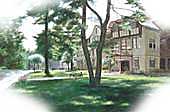Summer
1989
The Wilderness
of Paran
Charles Haun
Bible Teacher
It is beautiful. It is a wonderful place, this spiritual
wilderness called Paran.
The Wilderness of Paran is "glory" or "beauty,"
according to the meaning of the Hebrew word "Paran,"
(6290 in Strong's concordance).
To see the wilderness in such gratifying terms, one must
first become aware of God's intentions in bringing a person
into the wilderness. Once a believer comes to this awareness,
he can then begin to understand why and how glory and beauty
are in the Wilderness of Paran.
THE WORKSHOP
The wilderness is God's workshop. He has designed it for
us. He brings us to it, "even every one who is called
by My name, whom I have created for My glory," Isaiah
43:7. We are brought there to see His glory, to relate to
it, to learn from it, and most importantly, to be conformed
to His image. We would prefer that God does all His work on
us in green grass and beside still water. Although these and
other lovely and pleasant places are part of our Christian
experience, certain types of work are not accomplished in
us, except in the wilderness.
The wilderness is a part of our development. It is necessary
for our growth. It is God's method for opening our vision
to Himself and to His provisions for us. It is that which
the Lord uses to bring spiritual enrichment into our lives.
It is a method that God uses to develop our faith and trust
in Him. The wilderness is an essential part of the Christian
life, whether we like it or not.
When I entered Bible school as a first year student, the
Lord was like a bright light to me. His presence was so near
and intense that I could neither eat nor sleep on a regular
schedule. I loved the light. But after several weeks of this,
it all lifted, and I found myself in total darkness, and dryness.
I was in the wilderness. I was impressed. I was terrified.
I learned darkness and dryness. More importantly, I learned
many things which can be learned only in such circumstances.
I learned that God is faithful tome, even in dryness. I learned
that He could be my light, even in darkness. But the greatest
event spanning those two years in the wilderness was the treasure
I gleaned for myself. I came out with a complete trust in
God. So complete that it defies description. So complete that
I would expect no one to believe its extent. This treasure
of perfect trust was worth the two years of darkness and dryness.
The wilderness was the place of opportunity. Here, from
the Wilderness of Paran, the Children of Israel could have
moved into greater opportunities. The possibility of taking
the Promised Land was theirs. God Himself actually initiated
the conquest of Canaan at this time from this place, as seen
in Numbers 13:3. "And Moses by the commandment of the
LORD sent them from the wilderness of Paran: all those men
were heads of the children of Israel."
The wilderness may not be seen by some people as being a
launching pad into an orbit of spiritual reality and living.
But the wilderness is that, and more. It is a place of opportunity.
The Children of Israel were brought into the Wilderness of
Paran for the specific and expressed purpose of going farther,
to possess the Promised Land.
There are two areas of blessing as related to the wilderness.
One area is the blessings that are within the wilderness.
The other area is the opportunity for blessings based upon
the wilderness itself. The Promised Land was the opportunity
for blessings based upon how the children of Israel responded
to God in the wilderness.
LESSONS
God's direction can be seen and somewhat understood as the
Israelites first approach the Wilderness of Paran (Numbers
10:12). "And the children of Israel took their journeys
out of the wilderness of Sinai; and the cloud rested in the
wilderness of Paran." This was not their choice, rather
it was God's choice; it was God's direction for them. The
Israelites simply followed the cloud, stopping where it stopped,
moving when the cloud moved. Here, the cloud stopped in the
Wilderness of Paran.
The first lesson to be learned is to follow the cloud. The
believer must learn to follow what he knows to be the direction
of God.
Don't be afraid of the wilderness. Times in the wilderness
will become the only occasions when God imparts certain divine
meanings and rich revelations to us. The wilderness will be
the place of our greatest progressions in God. There are certain
things which God can bring to us only in the wilderness, as
we properly relate to His glory in the wilderness.
The second lesson to be learned is that we are not to complain
and question God as we follow. "Why did the cloud stop
here? Doesn't God know that there is no water here?"
"Why does God lead us into the wilderness? To kill us
because there are no graves in Egypt?"
The children of Israel followed the cloud to green grass.
The name of the place was "Hazeroth." The stem of
this Hebrew word "Hazeroth" (2698) means "green,"
"grass," "leeks," "enclosure."
This Hazeroth must have been a luscious place. "The International
Standard Bible Encyclopedia" refers to it as "the
best pastures," (page 3067, b). This would have been
most pleasing to those camping there. When we go camping,
we don't like to camp in the desert, or in a wilderness. We
like to camp in an oasis; we like to camp where there is much
green grass and a stream with fish. How long are we allowed
to camp in he green grass beside the still waters? Not very
long.
We must follow the cloud. It moves from Hazeroth, as recorded
in Numbers12:16. "And afterward, the people removed from
Hazeroth and pitched in the wilderness of Paran." The
green grass of Hazeroth is desired by all, but it does not
fully and totally meet man's spiritual needs. The leadership
directly under Moses failed in the green grass. There, "the
anger of the LORD was kindled against them (Aaron and Miriam);
and he departed," Numbers 12:9.
POINT OF VIEW
What is seen, or not seen in the wilderness depends upon
our point of view. Our point of view is the direction in which
we habitually look. "And it came to pass, as Aaron spake
unto the whole congregation of the children of Israel, that
they looked toward the wilderness, and, behold, the glory
of the Lord appeared in the cloud," Exodus 16:10. The
gaze of the Israelites had just been on the meat which they
did not have, but desired to have. Only when they looked toward
the wilderness did they see the glory of God. The glory of
God was not in the meat that they desired.
The reason why many believers, upon many different occasions,
miss seeing the glory of God is that they are looking toward
that which they desire. They are looking toward Canaan Land,
when they should be looking toward the wilderness.
If the glory of God is appearing in the wilderness, and
we want to look longingly and constantly at the Promised Land,
we may see the Promised Land, but we will not see the glory
of God. When the glory of God has come to the wilderness,
it is time to give the wilderness our attention.
A particular opportunity is seen in verse two of Numbers
13. "Send thou men, that they may search the land of
Canaan, which I give unto the children of Israel." These
men are going to search and discover. They are going to move
toward that which God had promised them.
Although many are brought to the wilderness to see the glory
of God, not all see it. The direction of our vision at any
particular time in our life will determine what we will see.
It will also determine what we are not seeing of that which
God wants to show us. We will miss seeing His goodness if
we constantly gaze at unfulfilled desires and long for the
comforts of the flesh.
Let us lay aside our fleshly desires and follow our Maker
without complaining and without questioning. As we accomplish
these things we will see more clearly the intentions and purposes
that God has for us.


